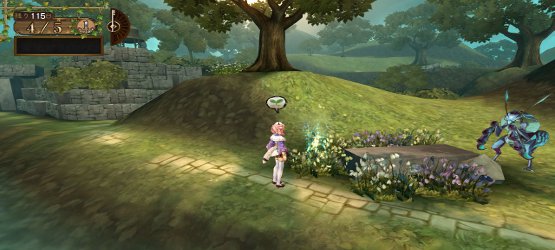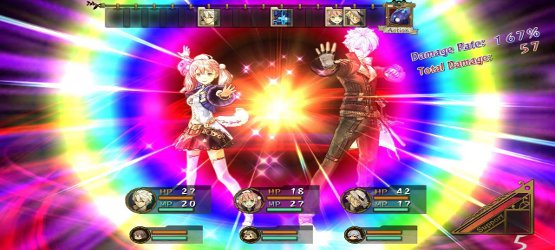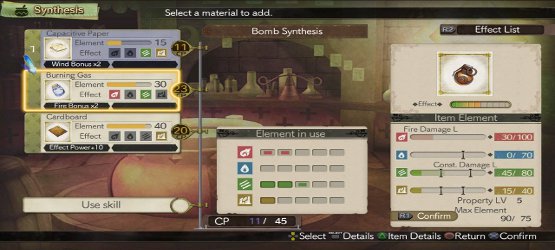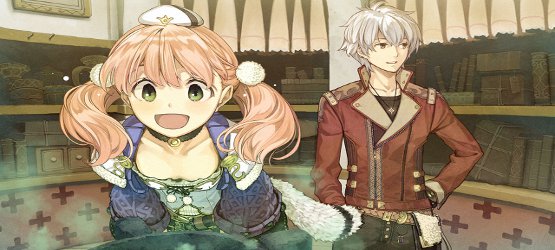As someone who has felt rather lukewarm towards the Atelier games, I had low expectations for the latest entry in this long standing series. The past few titles have felt rather tedious to play through and have been found missing that certain “it” factor. After playing through the latest entry, Atelier Escha & Logy: Alchemists of the Dusk Sky, I can safely say that developer Gust has righted a lot of what has plagued the series in past and taken a huge leap forward.
The steps forward I just mentioned will become apparent as you first load up the game. Players will have the option to play as one of two characters, a first in the Atelier series. You can either jump in as Escha Malier, a young alchemist who uses traditional alchemy, or Logy, a trained alchemist in the latest techniques. Logy has traveled to the frontier and a city named Colseit, to join the R&D division with town local Escha. The R&D division has fallen on hard times in the town and it is up to your party to rectify this and boost your public rating. It’s a nice change of pace to be able to choose between a female or male lead, and both characters are equally well balanced and enjoyable. Say goodbye to the annoying female characters of past and say hello to a duo that really makes this story and game pop.
The main sticking point in Atelier Escha & Logy, just like the other Atelier games, is time. Everything you do from creating items to moving between points on the map takes up time. The time aspect of Escha & Logy doesn’t feel as unforgiving as games past and for me that felt like a good thing. At times with past games, I would find myself far too stretched for time, similar to how you feel when playing the Sims. In E&L, I never found myself sweating the time aspect, often finishing my main task each Quarter with 20-40 days left to spare. For some this might hurt the experience, but for me it allowed me all sorts of free time after the main task to collect money, complete administration tasks, upgrade weapons, and explore. Have no fear though, the time aspect is still extremely important and you still must manage your time as one wrong trip could easily kill off 7-10 days.

Every four months you will receive a new main quest to tackle, with the next four months available to complete said task. Outside of this project, you will also be able to accept tasks from Solle in the Administration department. These side quests range from defeating a set amount of monsters to collecting ingredients from out in the field or making them in the atelier cauldron. All of these missions improve your rank and credibility in the town, while also earning you some much need cash. I have read in some places where they thought money was hard to come by, however I didn’t have too much of an issue with this. You get a monthly stipend that comes in every month and if you are smart with your money spending, this is usually enough. Later on in the game you do feel a bit of a money crunch as you use more items, thus depleting a lot of your stipend. Items used do replenish when you head back into town but for every item replenished, your stipend received at the beginning of the next month reduces.
Alchemy is a huge part of Escha & Logy, and is definitely simplified from the past games. As you select which item you want to craft, you have to then pick out all the ingredients to make the item. Pay attention to the properties of each ingredient, as they have a chance to effect the outcome of what you are crafting. Make sure you check on the CP as you start to mix the ingredients, using skills to reduce CP cost or taking away the earth skills of a item to improve the rest of the item. The game does a great job of making this part of the game interesting and deep, without ever feeling overwhelming.
Combat is one of the aspects of Escha & Logy that I think has really been improved. In years past I often felt bored during combat, but things have thankfully turn positive this time around. You have three main characters in your party to go along with three support characters. Each character has their own very redeeming characteristic in battle, meaning that you will want to be very smart about who you have as support and how you use that support. As you hit enemies in battle, your support gauge will fill up, allowing you to perform extra attacks with your 6 members of the party, as well as block an incoming attack on someone who is low health.

Outside of your basic attacks, you will also learn new skill attacks as you level up and also unlock Special Support attacks that use each characters strength to the utmost potential. You will also want to be very careful of Escha & Logy in battle, as these are the only two alchemists of the group and thus, they are the only ones that can use healing items on your party. The strategy here keeps the battles fresh and with more than 6 characters, you will have to play musical chairs to bring out the best party for the situation. It really is a good combat system that will afford you enough good times without ever feeling too tedious.
The one knock that I will give to the game and specifically the combat is that for the first three years or so, you won’t find yourself having much trouble at all with the enemies. However, come year four, the combat becomes a lot harder and if you haven’t prepared yourself for that the previous years, you will be in for a rude awakening. This is not a huge issue with the game however and as long as you are prepared, this shouldn’t be a huge issue.
Graphically, I have to say this is the best looking Atelier game I have ever seen, when it comes to characters. With graphics similar to that of Borderlands, character models really pop out at you and look great! The same can’t really be said for the environments, with the town and surrounding locations looking a bit less than special. Each character is given a special dose of treatment, with unique outfits and a sense of flair surrounding each one. Enemy models are a bit of a mixed bag, with the bosses looking pretty cool but the regular, run of the mill enemies looking a bit bland.

The graphics in the game aren’t what makes or breaks it though, as the characters and their personalities really set the stage and move this game into stardom. Each character has their own unique little quirks. Solle is an extremest when it comes to following the rules, while Linca loves to run around and do whatever she can for everyone else. It is the little things like this that really make a huge difference in the game and really set it apart from the rest of the series. Not only the playable characters make an impression but everyone from the vendors in town and throughout the world makes a difference. The only real issue I had with the story was at times it seemed like an afterthought to the rest of the game. In fact, I found myself skipping through a lot of dialogue just to get to the next mission or to the atelier to make items.
Sound work is really a positive as well, even through some of the spotty English voice work. It is no where near as annoying as some other RPGs out there, but some characters are better than others. Reyfer for instance is one character that could use a bit of an overhaul, not because he is annoying but more because his voice doesn’t really seem to fit his character much. The main score in Escha & Logy is downright fantastic and really sets the stage from the beginning. The rest of the game’s audio does a nice job of complementing the game without dominating it or over doing it.
Atelier Escha & Logy: Alchemists of the Dusk Sky is the game I have been wanting from the Atelier series for some time. It has two main aspects of the game and it executes both of them to a high degree. The game is the perfect entry for newcomers to the series and also provides plenty of depth and Atelier staples for those series veterans. The improved combat, ease of item crafting, and the relaxed time constraints make for an enjoyable game without making it a snooze fest. This is a game to easily sink 25+ hours into and even offers a new game plus to enjoy the story from the perspective of both leads.
-
Easier than past Atelier games
-
Great character depth from main ones to side characters
-
Combat is fun and deep, lots of options
-
Making items is a lot easier, more enjoyable
-
Two main characters, different view points
-
Easier than past Atelier games
-
Story can take a backseat to the rest of the game, not very deep








